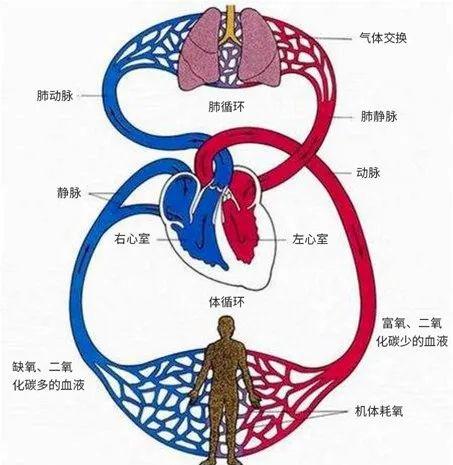answer:
First of all, it can be clear that asphyxia is a physiological response caused by the body's lack of oxygen with the participation of the nervous system. For ease of understanding, we only consider the cause of asphyxia – lack of oxygen.
The oxygen circulation system of our body can be briefly answered by the following figure: human blood circulation is divided into systemic circulation and pulmonary circulation. Blood flows through blood vessels and can be divided into venous blood and arterial blood depending on the oxygen content of the blood. Venous blood is pumped from the right atrium into the right ventricle, which is still venous blood at this time, the flow rate is relatively slow, and then enters the pulmonary circulatory system, and the blood and the lungs exchange gases and becomes oxygen-rich arterial blood. Arterial blood enters through the left atrium, through the left ventricle into the aorta, into the systemic circulatory system. The blood is then transported to various tissues and organs of the body. Near the body's tissues and organs, the aorta is connected to the veins by capillaries. When arterial blood enters the capillaries, the oxygen in the blood is received by the cells near the capillaries under osmotic pressure, and the carbon dioxide produced by the cells is transported to the blood vessels, and when the blood passes through the capillaries, the oxygen content is reduced, becoming venous blood, which is then transported to the heart. In this way, the oxygen cycle of our body is completed.

Graphs are derived from the network
Next, we consider the effects of taking a cold bath on the oxygen cycle. Sudden exposure of the chest cavity to a large area of cold water can cause the heart to beat less frequently (of course, over time, the body needs to respond to the cold). Through the action of hormones and nerves, the heartbeat rate will gradually recover), the pumping amount of blood will be reduced, and then the exchange efficiency of oxygen in the alveoli will be reduced in the short term, resulting in a decrease in the oxygen content of the blood and the body is in a state of hypoxia. In addition, when the body is suddenly exposed to cold water in a large area, the capillaries will contract to reduce the surface area in contact with the skin and achieve the purpose of keeping warm. There is less blood in the capillaries, so the amount of oxygen delivered to the body's tissues and organs is reduced, which can also lead to hypoxia in the body. It should be noted that the feeling of suffocation occurs only when the body is in contact with a large area.
Resources:
capillary
Heartbeat (medical term)
Asphyxia (physiological phenomenon)
SUN Jie, LI Gangsong. Effect of Temperature on Heart Rate and Heart Rate Variability[J]. Advances in Anatomy, 2007, 13(001):87-90.
by fruit grain orange